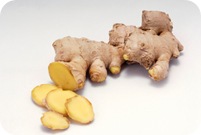One hundred and fifty reproductive aged women with primary dysmenorrheal (menstrual cramps) were divided into three groups, in a double-blind clinical trial. Group one received ginger rhizome powder capsules, 250 mg four times a day for three days starting day one of their menses. The second group received 250 mg mefenamic acid capsules, four times daily days one through three, and the third group took 400 mg ibuprofen capsules four times daily again, days one through three of the menses. Assessment was performed after one menstrual period.
 At the end of treatment, the severity of dysmenorrhea decreased in all groups and no differences were found between the groups in pain severity, pain relief or satisfaction. More women in the ginger group became completely pain free, vs. the mefenamic acid and ibuprofen groups. The rate of satisfaction from the treatments was 20/50 women in the mefenamic acid group, 22/50 women in the ibuprofen group and 21/50 women in the ginger group.
At the end of treatment, the severity of dysmenorrhea decreased in all groups and no differences were found between the groups in pain severity, pain relief or satisfaction. More women in the ginger group became completely pain free, vs. the mefenamic acid and ibuprofen groups. The rate of satisfaction from the treatments was 20/50 women in the mefenamic acid group, 22/50 women in the ibuprofen group and 21/50 women in the ginger group.
The cause of menstrual cramps is thought to be due to an increased production of prostaglandins in the endometrium (lining of the uterus). Menstrual blood of women with primary dysmenorrhea has greater amounts of the prospasmodic and proinflammatory prostaglandins, PGE2 and PGF2 alpha. Both mefenamic acid and ibuprofen act as inhibitors of the synthesis of these prostaglandins. It is thought that the anti-inflammatory properties of ginger are due to the gingerols, also leading to and prostaglandin reduction as well as some inflammatory substances. Consider using ginger root either alone, or in combination with other important natural ingredients in the relief of menstrual cramps such as cramp bark, niacin, vitamin B6, valerian, wild yam and more.
References
Ozgoli G, Goli M, Moattar F. Comparison of effects of ginger, mefenamic acid, and ibuprofen on pain in women with primary dysmenorrhea. J Alternative and Complementary Med 2009; 15(2):129-132.

